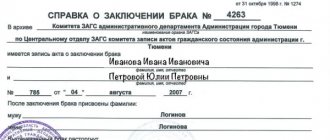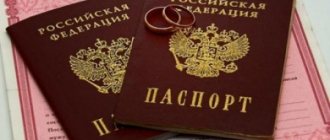When getting married, using a double surname is a long-standing tradition that was actively practiced in the pre-revolutionary period. During the Soviet Union, the dynamics of the use of this form decreased, but in the 21st century, the interest of citizens has grown again. According to statistics, about 75% of girls take their spouse’s surname when getting married, 17% leave their maiden name, and only 8% prefer the couple format.
However, if such a desire arises, citizens need to know the nuances of undergoing such a procedure, as well as possible difficulties.
Is it necessary to change?
The most common option is when the wife takes her husband’s surname. This is a historically established tradition. But in recent decades, more and more spouses are leaving the surname given at birth. The choice depends on family traditions, religious beliefs, social status, degree of emancipation, degree of education and other factors.
Changing your surname upon marriage is a personal decision for each person entering into a marriage.
When registering a union, the law gives future spouses the right to choose:
- take the surname of one of the spouses as a single one;
- keep each spouse's premarital surname, i.e. don't change anything;
- combine two surnames together, i.e. form a double one.
There are nuances when concluding a marriage in the Russian Federation with the following categories of citizens:
- with a prisoner;
- with a foreign citizen;
- with a pregnant woman.
Whose last name will be first?
Whose last name will be first?
Family law gives freedom to newlyweds in choosing the primacy of their surname. There are no rules. The couple decides whose last name is first.
The only point that future spouses and registry office employees should pay attention to is euphony. The latter can give advice, but they have no right to force you to abandon the chosen option. Therefore, if your last name sounds bad or seems absurd, no one can force you not to take it.
Is it possible to carry out the procedure after the wedding?
Often, when registering a union, each half of a married couple retains their premarital surname. And over time, if certain circumstances arise, one of the spouses decides to change their last name. So is it possible to change your last name after registering a marriage, for example, after a year?
In this case, the norms of family law cease to apply, since the act of civil status has already been completed, and administrative norms related to changing the surname come into force.
Changing your surname after marriage is acceptable , but the registration procedure is different.
An individual who is 14 years old has the right to change his surname, patronymic, and first name by his own decision at any time in his life (Article 58 of the Federal Law of November 15, 1997 No. 143-FZ). This procedure is officially called a name change. It is formalized in the civil registry office by submitting a special application and paying the state fee.
Why is it not necessary to observe this tradition in the 21st century?
If earlier the custom had practical benefits, now it has turned into just a ritual.
The Lifehacker Telegram channel contains only the best texts about technology, relationships, sports, cinema and much more. Subscribe!
Our Pinterest contains only the best texts about relationships, sports, cinema, health and much more. Subscribe!
The person is important, not his family
Community membership plays a role mainly in corruption schemes. If you have a fairly big name, the traffic police inspector will turn a blind eye to violations, and the teacher will give “excellent” instead of “fail.” Your ancestry is only important when immigrating to Israel and when compiling your family tree.
A family in the generally accepted sense is no longer a clan, but a union of two equal people. Accordingly, the issue of surnames depends on how they agree among themselves. The Family Code, as we have already found out, provides them with a lot of options.
Last name matters
Not as a generic name, but as your personal identifier. It accompanies you from birth, is listed in your documents, and helps you understand that we are talking about you. Changing your last name can easily cause problems and reset your status in certain circles. For example, everyone may know the cool specialist Maria Igorevna Ivanova and talk about her on the sidelines. Masha Petrova will have to make a lot of efforts to become Maria Igorevna again. It may take time to build a personal brand after changing your last name Last name and career: how are they connected? up to a year.
And here's what foreign studies say: What's in a name?: 361.708 Euros… The effects of marital name change. When a woman takes her partner's last name, she is perceived as more caring and emotional, but less intelligent and competent, compared to the woman who left hers. Upon employment, she will be offered on average 861.21 euros per month less.
It’s not supposed to be like that “by nature”
If one can still argue about gender purpose (but there is no need), then surnames are obviously a social construct. Moreover, somewhere it is generally not accepted for a woman to change her. They do without this in Spanish-speaking countries, Italy, Korea, and China. And in England, where tradition is no less strong than in Russia, back in the Middle Ages, men happily took their wives’ surnames if they were from richer and more prestigious families.
Nobody belongs to anyone
A common argument is that a man takes responsibility for a woman, so she should take his last name. But this again is just a ritual, and a very patriarchal one at that. You can take responsibility for someone who is not fully capable, for example, for a child, as required by the law of the RF IC Article 63. Rights and responsibilities of parents in the upbringing and education of children. A woman is a full member of society.
Marriages with the same last name are no stronger
There is no evidence to support this. Otherwise, in a country where it is traditional to change a surname, the number of marriages would not have increased by 917 thousand marriages per year. In Russia, the number of marriages would have increased and the number of divorces would have decreased by 528 thousand divorces. It seems that the secret of happiness lies in something else.
Marriages based on partnership turn out to be much stronger. For example, divorces are less common CCF PRESS ADVISORY: It Got Better! Data show gender revolution's benefits to families in couples where household responsibilities are divided equally.
By the way, if a man continues to think that a family should have one last name, why does it have to be his last name? The law, as we have already found out, provides options.
Marriage is no more profitable for women than for men
Another common argument: a man doesn’t need marriage, for him it’s a compromise. So you too make concessions and change your last name.
However, studies show Women are happier without children or a spouse, says happiness expert, that women without husbands and children live longer and feel happier than their ringed “colleagues.” At the same time, married men not only live Marriage and men's health longer and feel better, but also fight serious illnesses more successfully - apparently, thanks to the care of their spouses.
Other advantages also turn out to be dubious:
- Alimony? On average, they amount to the Russian Monitoring of the Economic Situation and Health of the Population of the National Research University Higher School of Economics 7.5 thousand rubles. It would have been possible to spend this amount of money with a child only in 1970.
- Property division? In any case, premarital property remains with each spouse. What is acquired in marriage is shared; in one way or another, both have invested resources.
How to take a double?
When spouses do not want to give up their surnames, they can combine them into one. The law does not prohibit this. In this case, surnames are written with a hyphen.
There are some restrictions:
- if the premarital surname of one of the spouses is already double, the connection is not permissible, i.e. The law will not allow a triple surname (Article 28 Federal Law of November 15, 1997 No. 143-FZ);
- if the premarital surnames are the same, then the union is not permissible.
Important! When registering a marriage, you can only combine current surnames, those that the future spouses currently have. Those. It will not work to combine the surname of your grandmother, other relatives or celebrities, or your maiden name (if the girl was already married and changed her surname).
Whose will be the first?
The spouses decide this issue together, relying on personal principles and principles of euphony. The law does not regulate the sequence of surnames. Whose last name will be the first to be decided by the spouses. But the sequence of surnames for both spouses should be the same (and not Sidorov-Ivanov and Ivanova-Sidorova).
The law allows that only one spouse will have a double surname . And the second one will leave his premarital surname. However, his consent is not required.
Possible difficulties
This procedure has positive and negative aspects.
For example, newlyweds who have accepted this format of origin invariably raise the question of children. If the name form is simple for both, then legally it is forbidden to give children both. If they wish to make such changes, parents must act according to the established regulations. Note: during a divorce, people have the right to keep the form that was there during the marriage or return the old one.
An additional problem that newlyweds may face is disagreement. Thus, one of the parties may refuse to accept a complex form of origin, while the other, on the contrary, has such a desire. Russian laws allow one of the spouses to undergo the procedure, while the other does not make changes.
In addition, the regulations of individual regions of the Russian Federation should be taken into account. In a number of regions, authorities may hinder such a procedure due to cultural or religious views. To obtain information, you must contact the registry office. Refusal to register an application must be sent with an indication of valid reasons.
Paired descent is not passed on from husband to wife. If the husband is Petrov-Sidorov, then the wife by law cannot take her, because the format will already be triple. The problem is solved this way - the wife remains with a maiden origin or accepts the husband’s family in the form of Petrov-Sidorov.
Procedure for registering an alliance
A document that indicates the desire to become legal spouses is a joint application for marriage. It is submitted in person to the territorial registry office. You can also submit it through the MFC (Multifunctional) or online through the public services portal.
More information about where it is possible to get married can be found in this material.
You need to take the following documents with you:
- documents confirming the identity of the parties;
- documents confirming the termination of a previous marriage, if any (as a result of the death of a spouse or divorce);
- receipt for payment of state duty.
More information about the documents required for marriage can be found in this material.
If the spouses decide to change their surname at the same time as registering the union, then a separate application is not filled out for this. They express their desire for a change in the appropriate column of the application. The column looks like this: “We ask for state registration of marriage; assign surnames to: husband ________________, wife ________________.”
Important! The application is submitted jointly. Separate submission of applications is possible only in one case, when the application of the absent person is notarized.
Legislative norms
The procedure for completing the procedure for changing a personal form is defined in the legislation of the Russian Federation. The IC of Russia (article) establishes the right of a husband and wife to choose a surname, including a married name. The procedure is simple and consists of submitting an application for marriage, in which the bride and groom indicate their desire to join the family. The registry office staff will make notes in the relevant papers.
Article 32 of the Family Code of the Russian Federation “The right of spouses to choose a surname”
The right of spouses to choose a surname
What is the procedure like after registration?
If one of the spouses decides to change their surname after marriage, then they apply to the registry office with the following documents:
- application for change of surname;
- passport;
- birth certificate;
- marriage certificate (if married);
- birth certificates of children under 18 years of age.
The application is drawn up on a special form . Submitted to the Civil Registry Office, MFC (Multifunctional) or online through the public services portal.
The application shall indicate:
- information about the applicant (full name, citizenship, place of residence, etc.);
- surname chosen for replacement;
- the basis that served as the reason for the appeal, i.e. reasons for name change.
Reasons most often cited:
- the desire of one of the spouses to bear a common surname;
- desire to return your premarital surname;
- the desire to bear a common surname with children;
- the desire to change the surname to a more euphonious one and others.
The state fee for changing a name is 1,600 rubles . Payment details are posted on the website and in the registry office itself. Anyone wishing to change their last name must pay a state fee. Payment is not required only if you register a marriage and change your surname at the same time. You can pay the fee through a bank or ATM. More information about the state fee for registering a marriage can be found here.
The payment is confirmed by a receipt, check order or payment order with a bank note indicating payment. You can also pay through the Government Services portal when submitting an application through it. In this case, it is not necessary to print the payment document.
From the date of acceptance of the documents, the period for consideration of the application is no more than one month. After a month, a corresponding document is issued - a certificate of name change or refusal. In rare cases, the review period may be extended to two months.
Attention! In case of refusal to change the name, the registry office will provide a reasoned decision, which can be appealed in court.
If a positive decision is made, then the civil registry office employees register a new entry (last name) and issue a certificate of name change. Based on this certificate, the passport and other documents are replaced.
Those wishing to get married will need the following information:
- obstacles;
- registration deadlines;
- conditions of imprisonment;
- legal age of registration.
Positive and negative points
Positive sides:
- the beautiful sound of each part is enhanced;
- makes you attract attention all the time;
- reminds you every time of your roots, origin, parents;
- is a manifestation of respect for the husband or wife and for one’s family.
Negative points:
- standard documents may not have suitable columns;
- Difficulties may arise in everyday life due to difficulty remembering;
- the child may have problems at school with peers;
- There may be errors in spelling and pronunciation.
Before submitting an application, you need to assess the consequences.
What documents will subsequently need to be replaced?
- The passport must be replaced within 30 days from the date of change of surname.
- SNILS must be replaced within 1 month. If a citizen is employed, then SNILS is changed by the employer. Otherwise, the replacement is made independently by the citizen.
- The medical policy must be replaced within 30 days. Replacement is made through the employer or by personally contacting the insurance company.
- TIN. Replacement periods are not established by law. The taxpayer number itself does not change; only the corresponding column is changed.
- International passport. Replacement periods are not established by law. Ideally, change it immediately after changing your Russian passport. But you can wait and change just before your planned trip.
- Driver license. Replacement is required. Within 10 days from the date of receipt of the new passport. When checking documents and discovering non-compliance, driving with such a license is considered equal to driving without a license. This is fraught with a fine. And then changes are made to PTS, STS, OSAGO.
- Bank cards and accounts. Replacement is desirable as soon as possible to avoid confusion in translations. The salary card is changed through the employer. Other cards and accounts are reissued independently.
- The work record does not change. The employer makes changes to it based on the documents provided. The employer also issues an order to change the last name so that all personnel documents do not turn out to be documents for a “stranger” person.
- There is no need to change your educational diploma.
- There is no need to change property documents regarding ownership of real estate. It is enough to present to the authorities a certificate of change of name or marriage.
It is up to the spouses to decide whether to change their last name or not. To ensure that the procedure for changing documents goes smoothly, without missing deadlines or imposing fines, it is better to prepare for paper procedures in advance .
Why did such a tradition appear?
Traditions do not arise out of nowhere. They usually have logical, practical explanations.
In general, the surnames themselves appeared in Rus' quite late - around the 13th century. It is believed that they were first documented when listing the inhabitants of Veliky Novgorod who died in the Battle of the Neva. The process of “familization” continued until the beginning of the 20th century. And if for the nobility the family name was fundamental and important, then simpler people made good use of nicknames, patronymics and other methods of identification.
Most of the current surnames are family nicknames, that is, they demonstrated belonging to a certain clan. Upon marriage, a woman broke away from one community and joined another. It is no coincidence that wedding rites are so similar to funeral ones: a girl “dies” in her family and is reborn in another. Therefore, they washed her in the bathhouse and mourned her, and her husband carried her over the threshold in his arms, so that the spirit of his house would not think that she was a stranger. The girl supposedly appears there as a baby in labor, literally out of nowhere.
There was no fixation on the husband’s last name; no one entered it into any document. It’s just that all people who belonged to the same clan were identified by some kind of nickname. Individual personal data was not so important, because no one assigned you to a clinic or issued a visa. Many humble men got along without surnames, let alone women - they have no need for it in conditions of complete lack of rights.
There are other explanations. After all, the tradition exists not only in Russia:
- Religious. In the Gospel of Matthew it is written: “And he said, For this reason a man will leave his father and mother and be united to his wife, and the two will become one flesh, so that they are no longer two, but one flesh.” One surname symbolizes spiritual unity.
- Mercantile. Married women could not own property. All their property went to their husbands. One surname symbolizes legal unity.
- Overbearing. Since a woman has no rights, where would she go without her owner? First, this function was performed by the father, then by the husband.









